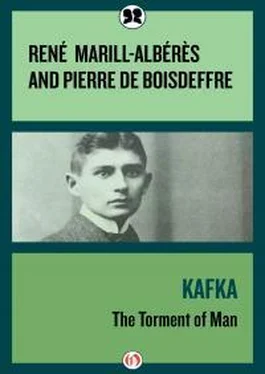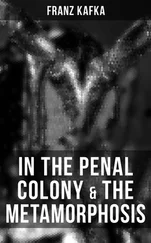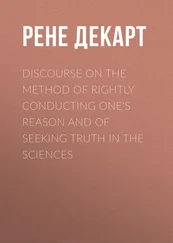It also is true that you have never beaten me, so to speak. But your shouts, your flushed face, your brash manner of snapping your suspenders and putting them on the back of a chair—all of this was almost worse than blows. The same thing applies to a man who is on the point of being hanged. If he is actually hanged, he dies and everything is ended. But if he is obliged to witness all the preliminary steps and told that he has been pardoned only after the noose is hanging over his shoulders, he may have to suffer for it throughout his whole life. To complete the picture, the accumulation of all these moments when, according to the opinion which you manifested clearly, I deserved a beating and barely escaped it only because of your pity, again made me acutely aware of my guilt. You cut me down from all sides at the same time. 10
In short, Kafka tells his father, you have acted toward me as if you wanted to humiliate me mortally while demonstrating to me three things: “… first that you are blameless, second that I am to blame, and third that out of sheer magnanimity you are ready not only to forgive me but also … to try to convince yourself—contrary to the truth of course—that I am also blameless.” 11
And Kafka reaches the bitter conclusion that “Nothing, not even your distrust of others, equals the distrust of myself on which I have been raised by you.”
The contrast between the two temperaments is striking: on one hand an extrovert, a sanguine, presumptuous man, a man of action, a realist who believes only in facts; on the other, an introvert, a weak, unassuming neurotic, an intellectual, an artist who seeks out the symbols behind things. For Franz, language is not a means but an end, inseparable from the creation of a work which beckons the author even though the latter still does not know what shape it will take. Similar contrasts are found in the relationship between many artists and their families—for instance, Gérard de Nerval, Baudelaire, Marcel Proust, and Katherine Mansfield. But with Kafka, as with Kierkegaard, this contrast gave rise to a sickness affecting his whole personality: the Oedipus complex was resolved only because it unconsciously assumed a religious significance. The Father is a despotic God (the Yahweh of the Old Testament) who prohibits his son from picking the fruit from the Tree of Life and places upon him the burden of a radical, permanent culpability . Furthermore, this unreasonable legislator does not observe the laws that he enacts. At the table his child has to submit to rules from which the Father is excused.
We did not have the right to crack bones, but you did. We did not have the right to lap vinegar, but you did … We had to be careful not to let a single crumb fall to the floor, but at the end there were always more around your place than anywhere else! We were supposed to do nothing except eat at the table, but you cleaned and trimmed your nails, sharpened pencils, cleaned your ears with a tooth-pick … 12
It follows, Kafka states, that his world proved to be divided into three parts: in one the son lived like a slave; in another the father wielded absolute power, busying himself with “giving orders” and “getting upset because they were not followed”; the third, presumed to be happy, was inaccessible. “The only countries where I can find a place to live,” concludes Kafka, his humility tinged with humor, “are those which you do not hide from me or those which are beyond your reach; considering how big you are in my imagination, they are neither very numerous nor very comforting.”
Kafka could never answer this fundamental question which his father asked him: “Who are you? What do you wish? Where are you going?” He was never able to justify his existence. “Lamentable” in his father’s sight, Kafka remained so in the presence of the whole world. He did not revolt. Far from condemning his father, he preferred to think that he himself was wrong: “Loneliness and repression gave birth to a feeling of guilt which is the key to his life and work.” 13
If he had been lacking in courage or insight, he would have escaped—into dissipation, the pleasures or pursuits of worldly life. If he had felt himself strong enough to resist, he would have chosen revolt. If he had found in the world a mediating love, he might have been able to transcend his original situation. All these roads were closed to him.
Kafka’s childhood was spent under the influence of this original curse, under the gaze of a father “who was always angry, always threatening.” 14As a schoolboy, he saw his father’s look in the features of his teachers. He wonders how he, “the most unfit and beyond a doubt the most ignorant,” has managed to steal his way into the classroom. He lives in fear of being the object of general attention: “I would be expelled immediately for the greatest jubilation of these righteous ones …” 15
As an adolescent he affected an indifference which would protect him, he believed, against the hostility of the world. His father had given him freedom to choose his own career. “But did I still have at my disposal such freedom? Did I have enough confidence in myself to choose a true profession? … I used to say to myself: face to face with reality, everything will be as indifferent to me as the subjects studied in school, so the important thing is for me to find the profession which will best accommodate my indifference. Consequently the study of law seemed to be the obvious choice … I drew my spiritual nourishment from sawdust which thousands of mouths had already chewed before me.” 16
His friend Max Brod, the unfaithful executor to whom we owe our knowledge of the man and his work (it was Brod who preserved and later published one by one the notebooks which Kafka had turned over to him for burning), advances a more satisfactory explanation.
Both of us felt ourselves honestly drawn only to creative art, but that we did not yet admit; furthermore, we had far too high a regard for art to care to connect it with all the sordidness that lay in the words and idea of “earning one’s living”—besides, we had no one to guide us, no one who could show us the way, if there was a way at all. We were so without guidance that to both of us the idea that there could be any other refuge than our hated studies never occurred seriously. 17
These studies in law and the profession to which they led weighed heavily on Kafka, who quite naturally conferred on his superiors the father’s “magical” power. On this issue, his friend Milena reports a characteristic trait. She had begged him to come to her home one day, but in vain.
He did not sleep for several nights, he chafed, wrote letters vilifying himself, ate his heart out, but he did not come. Why? He was unable to ask for permission … He could not even manage to tell him that he was coming to see me! And to tell him something else … how could he? Lie to a Director? Impossible! 18
In “normal” lives human love generally wipes out the last vestiges of the Oedipus complex. As we shall see, however, this means of resolving the conflict was withheld from Kafka as it had been withheld from Kierkegaard. 19Or rather, Kafka himself rejected it. He drew up an interminable indictment which forced him to acknowledge that he was totally unfitted for social living and therefore for marriage. The strange oneiric delirium that consumed the last part of his existence was simply the sequel to this verdict. 20
But the Kafka who feverously neared the age of thirty still had not become the fabulous animal whose last convulsions we observe in the Kierling sanatorium. He was simply a young man, intelligent, perceptive, pessimistic, attentive, and courteous, whose friends admired his gifts and were astounded by his failure to put them to better use. He had the mind and sensitivity but not the faults of a budding writer. His most striking qualities were humility as opposed to arrogance and naturalness as opposed to artificiality. At that time he resembled the young Proust, who was also treated as a dilettante because he showed no obvious signs of ambition and had too little appetite for material things. Still, he had not yet become the recluse, the desperate philosopher who would produce the masterworks of his maturity. He was a brilliant, often peerless conversationalist and—still like Proust—an admirable reader capable of breathing life into the least significant text, even a dull chapter by Georges Ohnet. Nor was he to be typed as a disembodied intellectual. As a youth, Max Brod relates, he was a helpful friend, a good swimmer, a good rower. But his personality can be summed up by saying that he had three traits that did not change—his culture , his modesty , and his inability to dominate his own life .
Читать дальше












